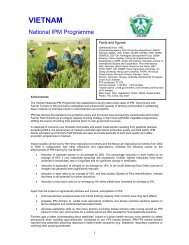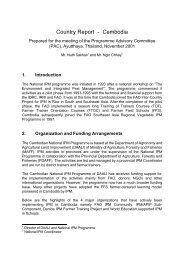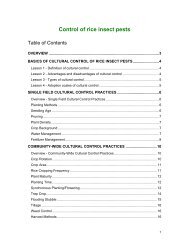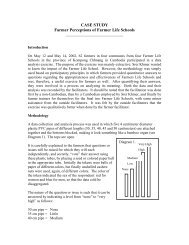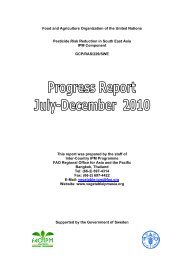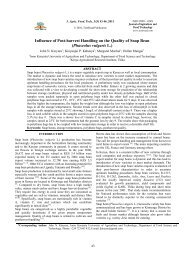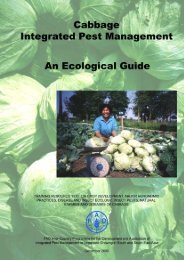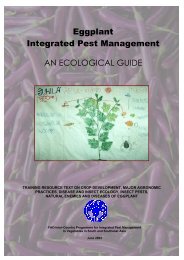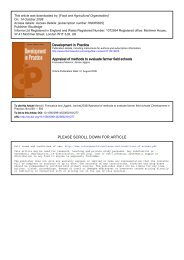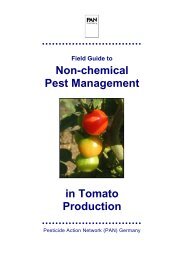Sustainable Potato Production - Guidelines for - FAO.org
Sustainable Potato Production - Guidelines for - FAO.org
Sustainable Potato Production - Guidelines for - FAO.org
- No tags were found...
Create successful ePaper yourself
Turn your PDF publications into a flip-book with our unique Google optimized e-Paper software.
Adding value in East AfricaA study was conducted recentlyacross the East African region toestimate the potential size ofthe market <strong>for</strong> fresh andprocessed potato in selectedcities in Burundi, Ethiopia,Kenya, Rwanda, Tanzaniaand Uganda. Findings showthat establishment of a viableindustry <strong>for</strong> processed potatohinges on improvementsin quality standardsand packaging and premiumprices <strong>for</strong> quality produce.The study said that expandedpotato processing wouldincrease employmentopportunities in city areas.With half of East Africansexpected to live in urban areasby 2015, the boom in demand<strong>for</strong> potato chips and French frieslooks set to continue.62SUSTAINABLEPOTATOPRODUCTIONEnhancing the value chain and marketsLearning to innovate and engagewith markets, and to becomemore competitive are mainchallenges facing small-scalefarmers. However, in many lowincomedeveloping countries,potatoes are typically marketedthrough fragmented chains withlittle coordination and poorin<strong>for</strong>mation flows, giving rise tohigh supply risks and hightransaction costs. Average yieldsremain far too low to enablesmall-scale potato growers toproduce a marketable surplus,preventing them from increasingtheir participation in potatomarketing systems. In addition,limited storage and transportfacilities can adversely affect thequality of tubers after harvest.Ef<strong>for</strong>ts to enhance the value chainwill only be successful providedthere are substantial levels ofpublic and private investment inthe subsector, such as in breedingprogrammes, infrastructuralimprovements and initiatives tosupport and coordinate activitiesalong the chain. Policy-makersshould increase support to thesubsector, by – <strong>for</strong> example –extending to the potato subsectorpolicies and resourcestraditionally focused on cerealsand on cash crops <strong>for</strong> export.The Participatory Market Chain ApproachThe Participatory Market ChainApproach (PMCA) wasdeveloped by the Papa AndinaRegional Initiative conducted inBolivia, Ecuador and Peru by theInternational <strong>Potato</strong> Center (CIP).The aim of Papa Andina is toimprove the competitiveness ofpotato market chains and smallpotato producers. PMCA hasproven effective instrengthening innovationcapacity and developing marketchain innovations that benefitsmall farmers as well asprocessors and distributors.Valuable capacities <strong>for</strong>innovation have beendeveloped, particularly in therealms of knowledge, attitudes,skills, and social capital. Thesenew capacities are potentiallyvaluable assets <strong>for</strong> stimulatingfuture innovations in marketchains. The benefits of the PMCAhave stimulated considerableinterest in the approach amongR&D <strong>org</strong>anizations, policymakers and market chain actors.



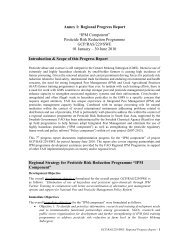
![Section 4 [ PDF file, 252 KB] - The Field Alliance](https://img.yumpu.com/51387260/1/158x260/section-4-pdf-file-252-kb-the-field-alliance.jpg?quality=85)
